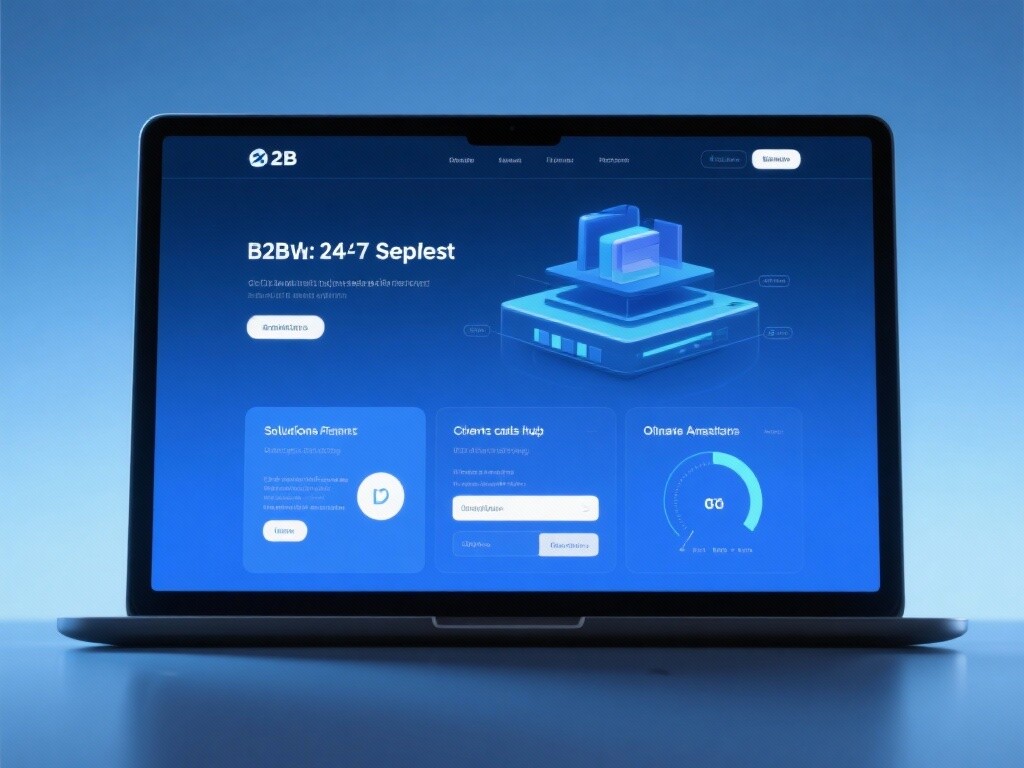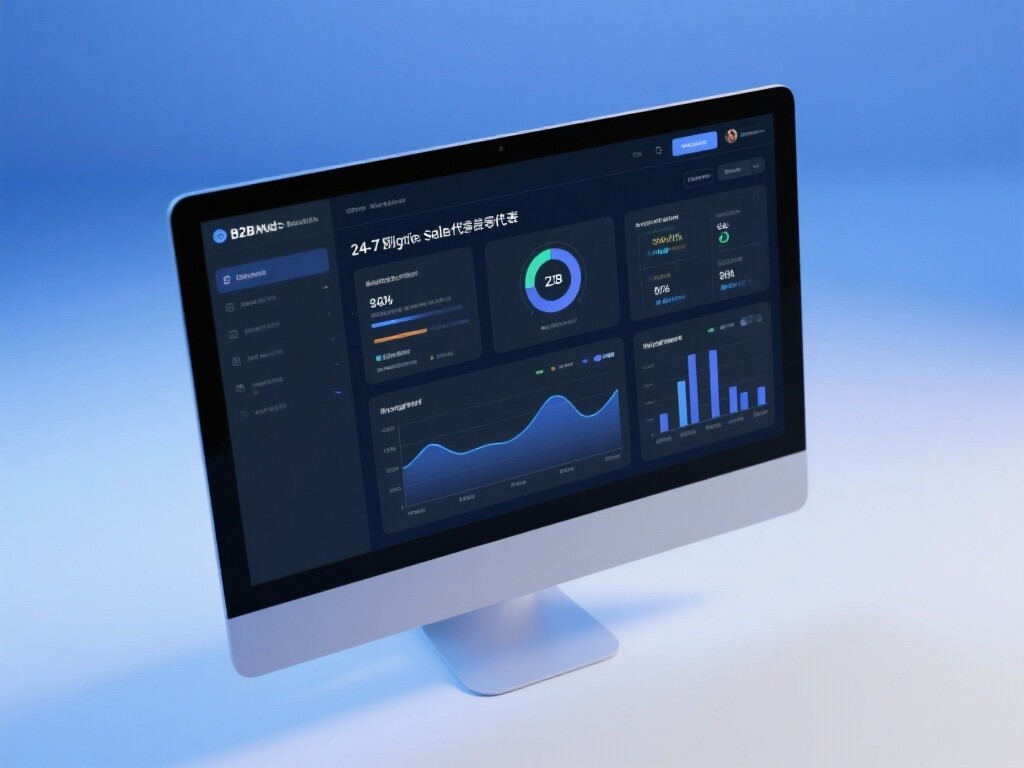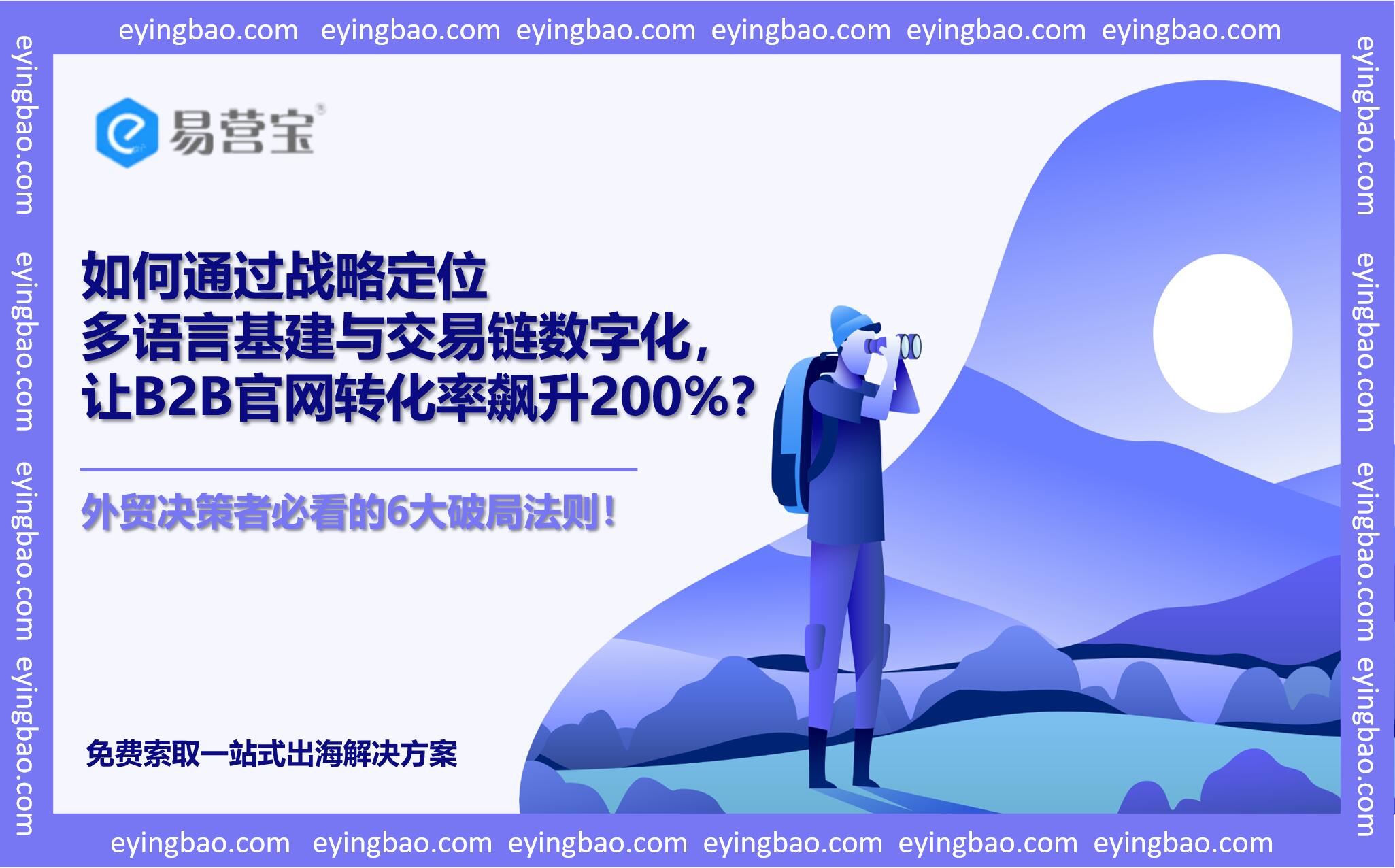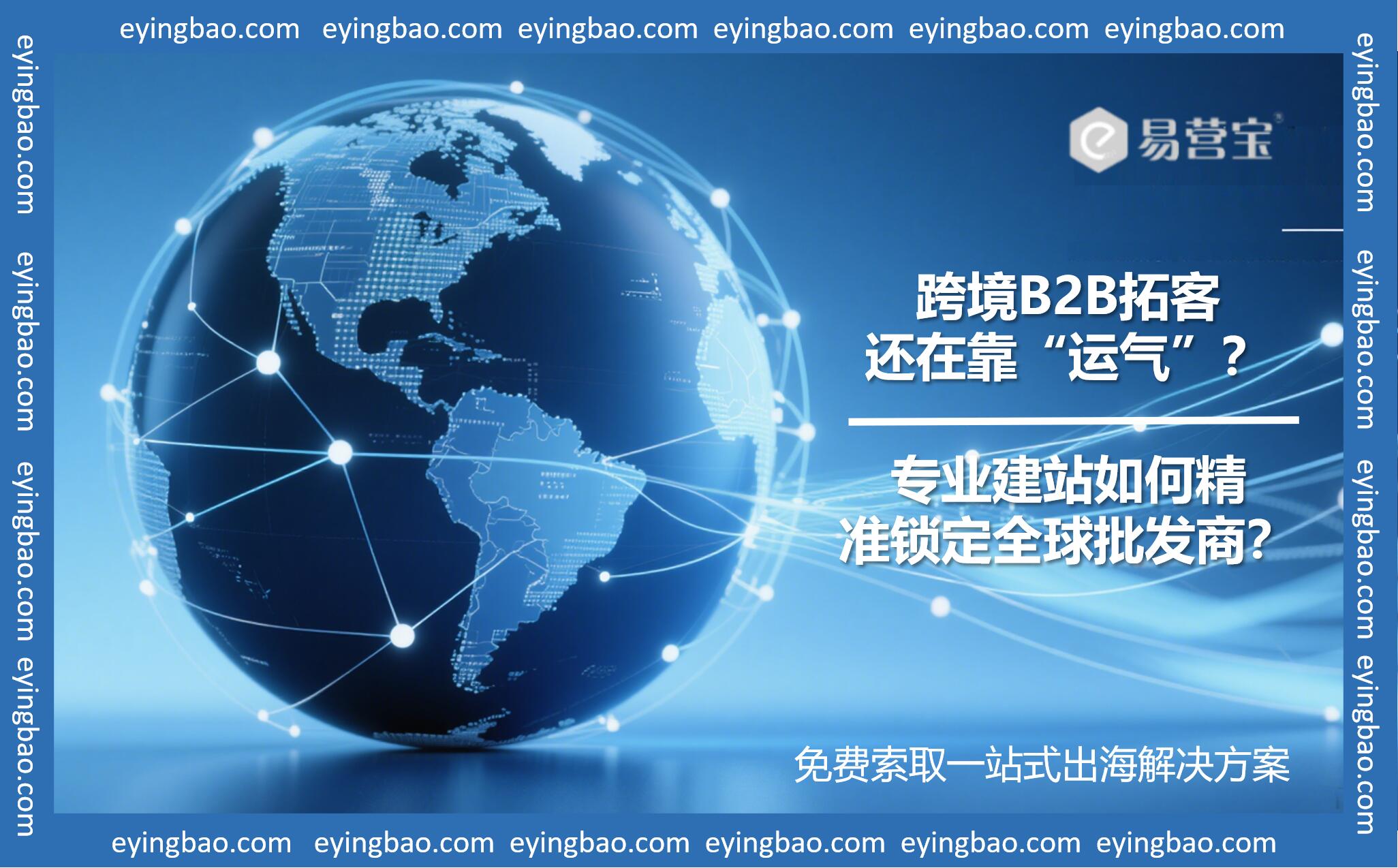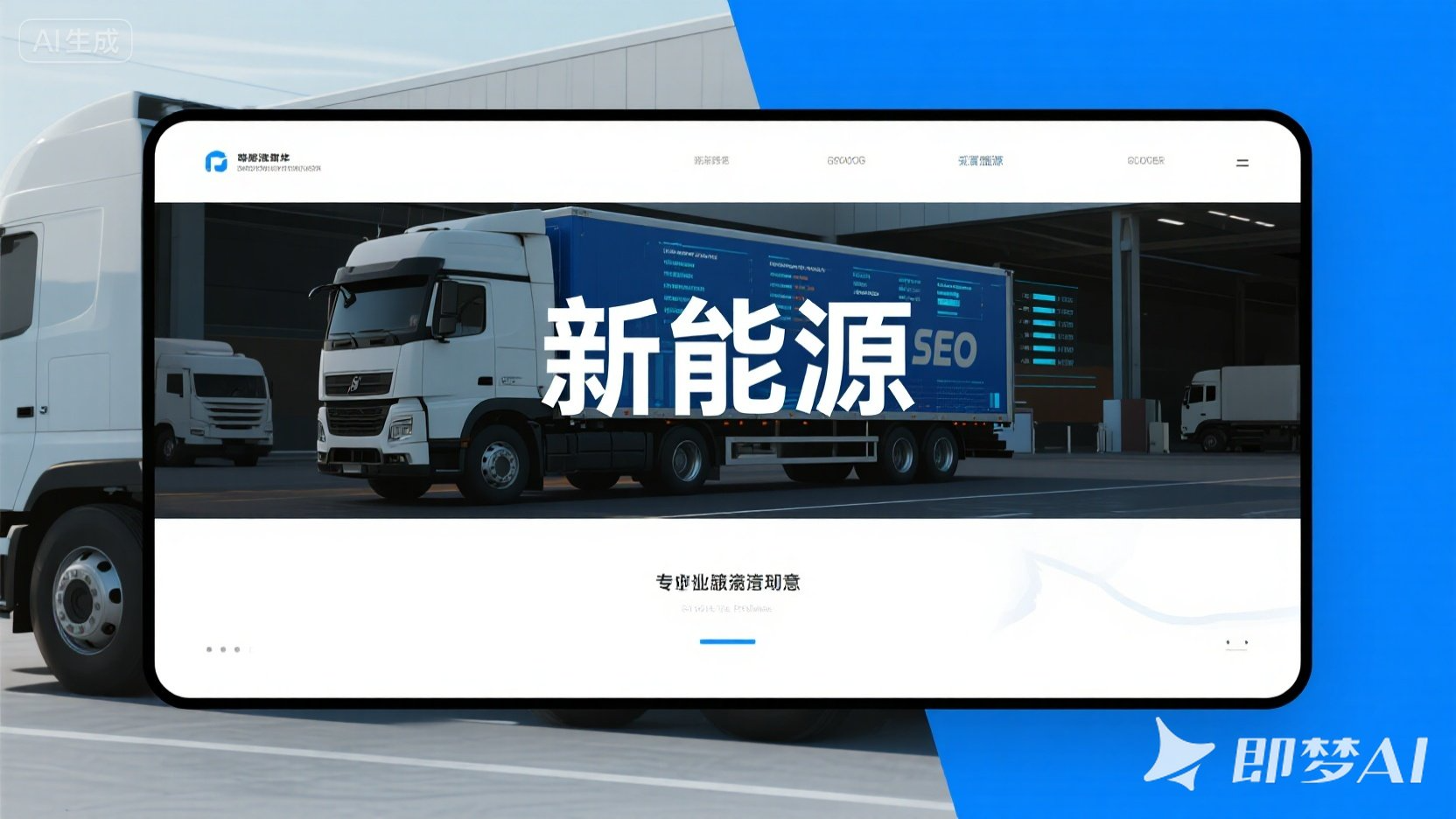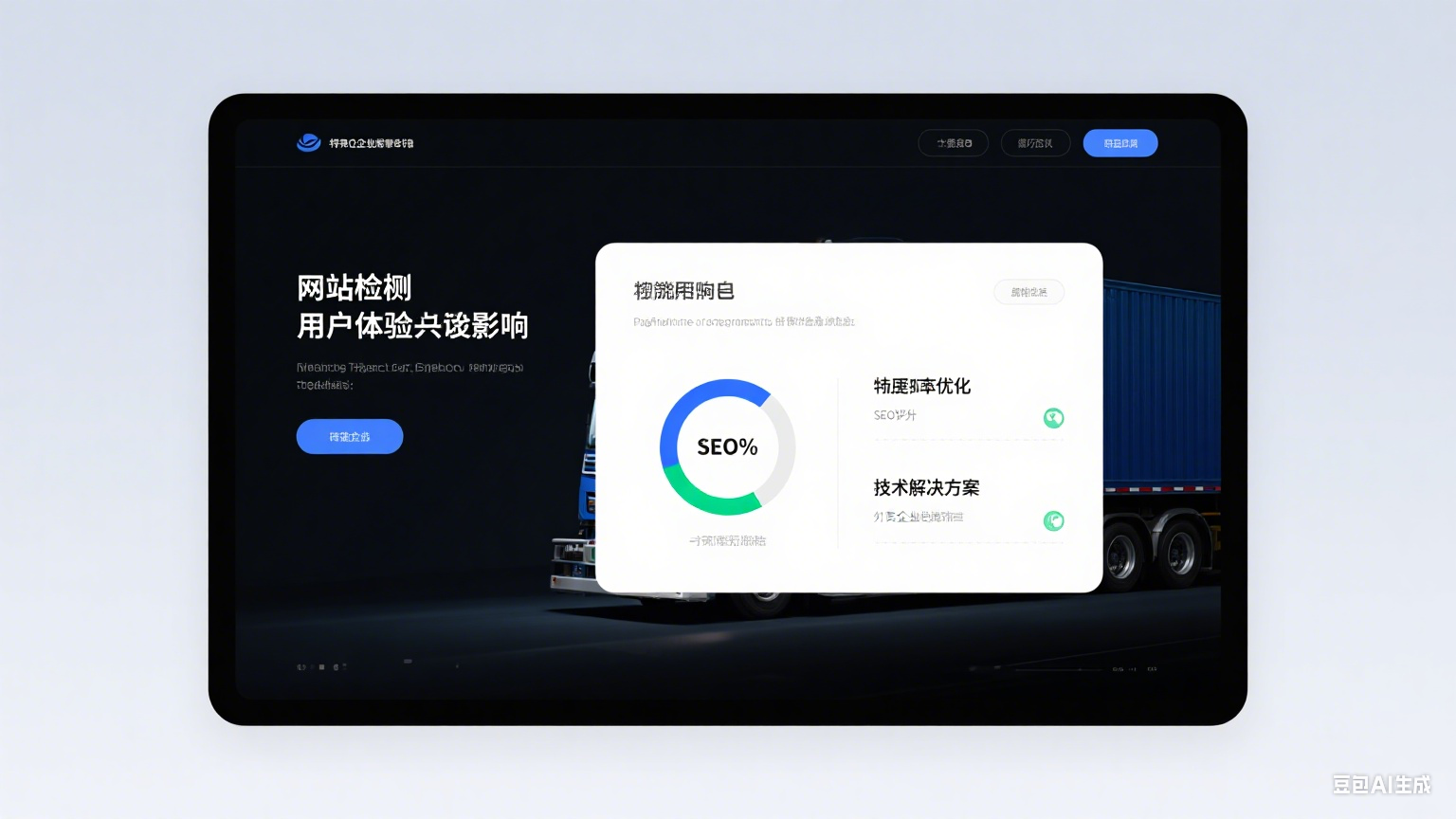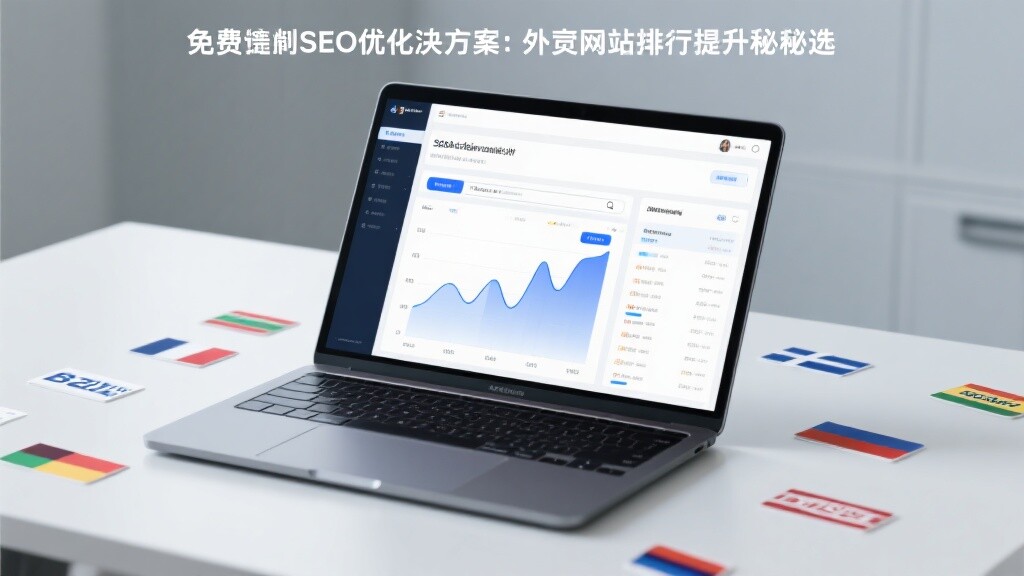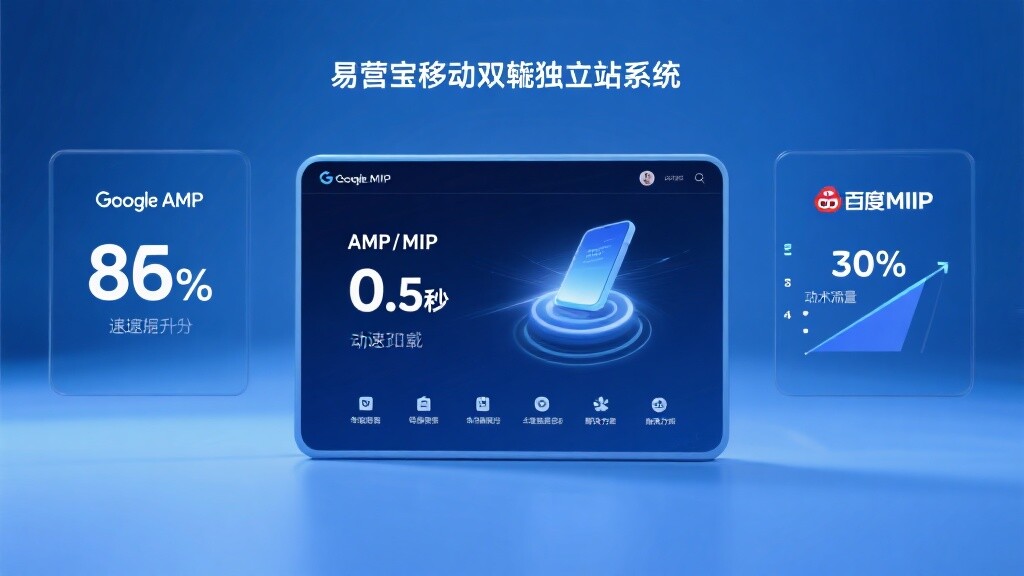I. Definition and Core Differences of B2B Websites
1. Definition of B2B Website
B2B Website refers to an official website that serves business-to-business transactions and commercial collaborations. Its core design and operational objectives are lead generation and establishing industry authority (E-E-A-T), rather than direct retail transactions. A B2B website must provide detailed solutions, technical specifications, success cases, and professional downloadable resources to support complex, multi-decision-maker procurement processes.
2. Core Differences Between B2B and B2C Websites
II. Evolution of B2B Websites: From Digital Directories to Content Hubs
The evolution of B2B websites reflects the shift in corporate marketing from product listings to solution-based marketing.
1. Early Stage: Online Directories and Static Displays (1995-2005)
Website Format: Simple HTML static pages, with functionality limited to displaying company profiles and product catalogs, resembling an electronic directory.
Operational Features: Websites served only as supplementary materials for offline sales, with traffic and inquiries primarily relying on B2B platforms (e.g., Alibaba) or trade shows.
2. CMS Popularization and Basic Inquiry Features (2005-2015)
Technological Shift: The rise of CMS systems like WordPress and Drupal made content updates and website management easier.
Functional Upgrade: Websites began incorporating basic inquiry features like "online留言" and "request a quote", but lacked content depth and SEO structure.
3. Content Marketing and SEO-Driven Strategies (2015-2020)
Strategic Shift: Recognizing the value of Google SEO traffic, websites started building blogs and case studies.
Core Focus: Website design began emphasizing user behavior paths, guiding users from informational content to decision-making content.
4. Automation Integration and E-E-A-T Dominance (2020-Present)
Technological Depth: B2B websites integrated deeply with CRM (e.g., HubSpot/Salesforce) and GA4, enabling automated lead scoring and nurturing.
Standard Elevation: E-E-A-T authority became critical for high rankings, requiring systematic display of technical patents, certifications, and industry expertise.
III. Technical Principles of B2B Websites: Lead Funnel and Trust Architecture
Successful B2B websites must ensure lead capture efficiency, data flow accuracy, and global accessibility performance.
1. SEO-Friendly Content Architecture
Topic Cluster Model: Website content should adopt a topic cluster model, centered on solutions, linking blogs, cases, and product pages to build content authority and internal link weight.
Long-Tail Keyword Optimization: B2B buyers often search with high-intent long-tail keywords (e.g., "XX industry automation solution providers"). The website structure must efficiently capture such traffic.
2. CRM Integration and Data Flow
Principle: Inquiry forms on B2B websites must send data in real-time to CRM systems via APIs or embedded code.
Objective: To enable real-time lead capture, automated scoring, and email nurturing, ensuring sales teams promptly follow up on high-value leads.
3. Core Web Vitals and Global Performance
CWV Requirements: B2B websites must meet Google's Core Web Vitals standards, ensuring fast and stable loading globally.
Implementation: Deploy overseas servers and global CDN acceleration; optimize loading speeds for technical documents, high-resolution images, and videos.
4. Data Security and Compliance
Principle: Given B2B websites often handle sensitive client information and trade secrets, they must feature high-level security (HTTPS) and comply with regional data privacy laws (e.g., GDPR).
IV. Core Features and High-Conversion Advantages of B2B Websites
Professional B2B websites address core pain points in complex sales cycles.
1. Solution-Centric Narrative Structure
Feature: B2B clients purchase problem-solving solutions, not products themselves. Website layouts should start from "client pain points" or "industry challenges", ultimately guiding users to "products/services".
Advantage: This structure quickly establishes rapport with potential clients and guides them into conversion funnels.
2. Strong E-E-A-T Trust-Building Capabilities
Feature: Procurement decisions involve significant investments; trust is a prerequisite. B2B websites must systematically showcase qualifications, cases, partners, and R&D capabilities.
Advantage: Establishing industry authority effectively shortens client due diligence time, increasing brand win rates in multi-round bidding.
3. High-Quality, High-Intent Lead Capture
Feature: Professional B2B websites attract traffic via content marketing and SEO, often targeting active solution-seeking decision-makers.
Advantage: Compared to generic leads from B2B platforms or trade shows, website leads exhibit clear intent and higher conversion rates, directly entering sales pipelines.
4. Effective Long-Cycle Lead Nurturing
Feature: B2B clients revisit websites repeatedly before decisions. Websites provide continuous value through quality blogs, whitepapers, and remarketing mechanisms.
Advantage: Ensures brands remain on client shortlists throughout long decision cycles, improving final conversion probabilities.
V. Deep Applications and Content Strategies for B2B Websites
B2B website content strategies must precisely match diverse needs of decision-makers at different stages.
1. Marketing Funnel and Content Deployment
2. Lead Nurturing Mechanisms
Mechanism: Leverage website behavior data (e.g., downloading whitepaper A without visiting pricing pages) to trigger CRM automated email sequences.
Content: Emails should be interest-based, delivering relevant cases or technical articles, gradually guiding clients into purchase stages.
3. CRO Inquiry Conversion Optimization Techniques
Form Simplicity: B2B inquiry forms should minimize fields, requesting only key information.
Value Incentives: Provide clear value propositions (e.g., "Get a customized quote, reply within 24 hours") instead of generic "contact us".
Multi-CTAs: Place multiple, clear CTAs at solution page bottoms, product page sidebars, floating buttons, etc.
VI. EasyProfit: Your B2B Website Development and Lead Growth Enabler
EasyProfit's B2B website development and optimization services are systematic projects based on high-authority E-E-A-T frameworks, deep CRM integrations, and data-driven CRO.
E-E-A-T Trust Architecture Design: From website structure to content planning, systematically highlight your technical expertise, industry authority, and commercial trust, ensuring higher Google rankings.
CRM/GA4 Deep Integration & Lead Scoring: Ensure seamless inquiry data flow to your CRM, enabling automated lead capture, scoring, and nurturing, letting sales teams focus on high-value clients.
B2B Content Cluster Strategy: Plan and guide creation of whitepapers, case studies, and solutions tailored to decision-makers' stage-specific needs, transforming websites into industry knowledge hubs.
High-Intent Long-Tail SEO Strategy: Focus on capturing high-conversion-intent B2B long-tail keywords for precise traffic and high conversion rates.
Global Performance & Security Compliance: Provide enterprise-grade overseas servers and CDN acceleration, ensuring ultra-fast global access and data security.
FAQ
1. What are the core differences in SEO strategies between B2B and B2C websites?
The core differences lie in keyword intent and competition level.
B2B SEO: Focuses on long-tail, high-intent, low-search-volume but high-commercial-value keywords (e.g., "XX industry solutions," "XX technology customization services"). Content must be authoritative, in-depth problem-solving guides.
B2C SEO: Focuses on short-tail, high-search-volume, high-click-rate keywords (e.g., "best running shoes," "summer dresses"). Content must be engaging, quick-converting product details.
2. What "trust elements" must a B2B website have to achieve effective conversion?
Must systematically demonstrate E-E-A-T signals:
Certifications and credentials: ISO certificates, CE marks, industry association memberships.
Customer case studies: Detailed Case Studies describing how you solved specific problems for renowned clients, highlighting results rather than processes.
Technical patents and R&D team introductions: Showcase your specialized expertise.
Clear contact methods and company address: Establish verifiable authenticity.
3. Will B2B website "Gated Content" affect SEO rankings?
No, as long as it's technically handled properly.
Principle: The content itself of Gated Content (e.g., whitepapers) shouldn't be indexed by Google (to prevent user experience damage). But you should let Google index the page introducing this whitepaper (landing page).
Purpose: Content walls exist to exchange potential client contact information and are key tools for B2B websites to capture leads. The professional approach is to provide content abstracts on landing pages and require users to complete a form to access the full version.
4. After completing B2B website construction, how to conduct effective "Lead Nurturing"?
Implement through CRM and email automation.
Tiering: Perform Lead Scoring based on customer download behavior (e.g., downloading price lists vs. downloading blogs).
Automated emails: Set up automated email sequences for different customer tiers. For example, send in-depth technical articles to clients who downloaded industry reports; send success cases and demo invitations to those who downloaded price lists.
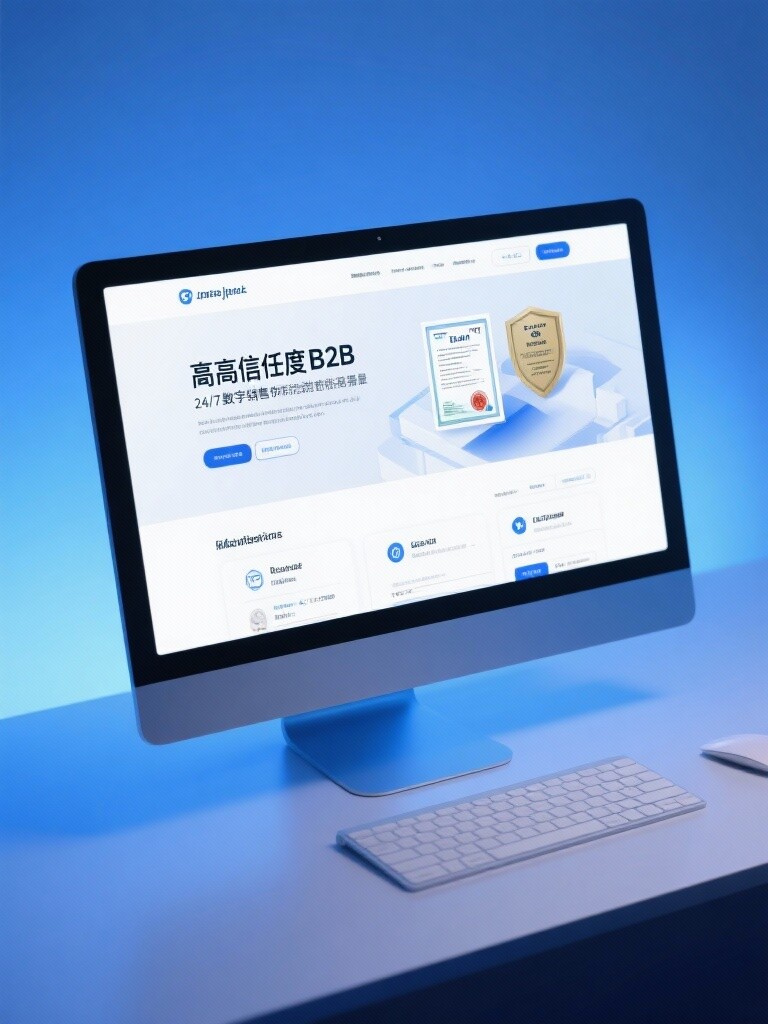
Customer Reviews
Mr. Qi, CEO of a precision machinery manufacturing B2B enterprise
"Our website used to be a typical product catalog with low inquiry volume and poor quality. The EasyB2B team redesigned our B2B website architecture with solutions as the core, systematically displaying our international certifications and technical patents. More importantly, they integrated CRM for us, achieving automated lead tiering and email nurturing. Now, inquiries from our official website show very clear intent, and our average sales cycle has shortened by 35 days. Our B2B website has truly become a high-efficiency, high-trust digital sales engine."
Ms. Chen, Marketing Director of a B2B cloud service SaaS platform
"We highly value content marketing and customer education. EasyB2B guided us to build topic clusters using our B2B website and set up multiple whitepaper Gated Content. Through GA4 and CRM integration, we can clearly track the entire journey from a lead's first visit to final contract signing. The website not only gained substantial SEO organic traffic but also generated extremely high-quality leads through content walls, with paid conversion rates far exceeding other channels. Our B2B website has become a strategic asset for SaaS platform growth."
![Six Core Elements of a High-Conversion B2B Website Six Core Elements of a High-Conversion B2B Website]() Six Core Elements of a High-Conversion B2B WebsiteExplore the six core elements of building a high-conversion B2B website, including precise positioning, efficient navigation, transparent information, etc., to enhance your website's conversion rate and user experience.
Six Core Elements of a High-Conversion B2B WebsiteExplore the six core elements of building a high-conversion B2B website, including precise positioning, efficient navigation, transparent information, etc., to enhance your website's conversion rate and user experience.![B2B Business Owners Must Watch! 3 Minutes to Teach You How to Build a 'Best-Selling' Website! B2B Business Owners Must Watch! 3 Minutes to Teach You How to Build a 'Best-Selling' Website!]() B2B Business Owners Must Watch! 3 Minutes to Teach You How to Build a 'Best-Selling' Website!Master Precise Positioning, Smooth User Experience, Detailed Information, Trust Building, One-Stop Service, and the Traffic Conversion Formula—6 Killer Strategies to Quickly Boost B2B Website Orders and Create a Best-Selling Website!
B2B Business Owners Must Watch! 3 Minutes to Teach You How to Build a 'Best-Selling' Website!Master Precise Positioning, Smooth User Experience, Detailed Information, Trust Building, One-Stop Service, and the Traffic Conversion Formula—6 Killer Strategies to Quickly Boost B2B Website Orders and Create a Best-Selling Website!![Is Your B2B Website Still ‘Sleeping’? 5 Strategic Tactics to Get Global Clients Actively Placing Orders! Is Your B2B Website Still ‘Sleeping’? 5 Strategic Tactics to Get Global Clients Actively Placing Orders!]() Is Your B2B Website Still ‘Sleeping’? 5 Strategic Tactics to Get Global Clients Actively Placing Orders!How Can a B2B Standalone Site Achieve 300% Order Growth Globally Through Precise Positioning, Multilingual Infrastructure, and Trust System Building? A Must-Read Cross-Border Growth Guide for Export Business Owners!
Is Your B2B Website Still ‘Sleeping’? 5 Strategic Tactics to Get Global Clients Actively Placing Orders!How Can a B2B Standalone Site Achieve 300% Order Growth Globally Through Precise Positioning, Multilingual Infrastructure, and Trust System Building? A Must-Read Cross-Border Growth Guide for Export Business Owners!![Why Does Your B2B Website Have Low Conversion Rates? These 6 Digital Engines Drive Global Buyers to Actively Close Deals! Why Does Your B2B Website Have Low Conversion Rates? These 6 Digital Engines Drive Global Buyers to Actively Close Deals!]() Why Does Your B2B Website Have Low Conversion Rates? These 6 Digital Engines Drive Global Buyers to Actively Close Deals!How to Achieve 200% Surge in B2B Website Conversion Through Strategic Positioning, Multilingual Infrastructure, and Digital Trade Chain? 6 Game-Changing Rules Every Foreign Trade Decision-Maker Must Know!
Why Does Your B2B Website Have Low Conversion Rates? These 6 Digital Engines Drive Global Buyers to Actively Close Deals!How to Achieve 200% Surge in B2B Website Conversion Through Strategic Positioning, Multilingual Infrastructure, and Digital Trade Chain? 6 Game-Changing Rules Every Foreign Trade Decision-Maker Must Know!![Still relying on 'luck' for cross-border B2B lead generation? Discover how professional website development precisely targets global wholesalers. Still relying on 'luck' for cross-border B2B lead generation? Discover how professional website development precisely targets global wholesalers.]() Still relying on 'luck' for cross-border B2B lead generation? Discover how professional website development precisely targets global wholesalers.The traditional B2B trade model is being revolutionized by digital transformation. Facing diverse markets like Europe, America, and the Middle East, how can cross-border wholesalers overcome information asymmetry and accurately reach target clients? This in-depth analysis explores specialized B2B website solutions, complemented by EasyYaBao's SaaS intelligent SEO tools for marketing, helping you build a high-converting professional international trade standalone site.
Still relying on 'luck' for cross-border B2B lead generation? Discover how professional website development precisely targets global wholesalers.The traditional B2B trade model is being revolutionized by digital transformation. Facing diverse markets like Europe, America, and the Middle East, how can cross-border wholesalers overcome information asymmetry and accurately reach target clients? This in-depth analysis explores specialized B2B website solutions, complemented by EasyYaBao's SaaS intelligent SEO tools for marketing, helping you build a high-converting professional international trade standalone site.![Multilingual Foreign Trade Website: Break Language Barriers, Expand Global Markets Multilingual Foreign Trade Website: Break Language Barriers, Expand Global Markets]() Multilingual Foreign Trade Website: Break Language Barriers, Expand Global MarketsThis article details the core value and technical implementation of multilingual foreign trade websites, covering key aspects like AI translation engines, global CDN acceleration, and integrated SEO+SEM marketing. It particularly provides localized solutions for Belt and Road markets.
Multilingual Foreign Trade Website: Break Language Barriers, Expand Global MarketsThis article details the core value and technical implementation of multilingual foreign trade websites, covering key aspects like AI translation engines, global CDN acceleration, and integrated SEO+SEM marketing. It particularly provides localized solutions for Belt and Road markets.![Website Testing: Identifying and Fixing Issues Impacting User Experience Website Testing: Identifying and Fixing Issues Impacting User Experience]() Website Testing: Identifying and Fixing Issues Impacting User ExperienceThis article provides an in-depth analysis of how website testing affects user experience, covering technical solutions such as performance optimization and SEO score improvement, with specialized insights for multilingual website testing tailored to B2B export enterprises like semi-trailer manufacturers.
Website Testing: Identifying and Fixing Issues Impacting User ExperienceThis article provides an in-depth analysis of how website testing affects user experience, covering technical solutions such as performance optimization and SEO score improvement, with specialized insights for multilingual website testing tailored to B2B export enterprises like semi-trailer manufacturers.![Free SEO Optimization Strategy: Foreign Trade Website Ranking Secrets Free SEO Optimization Strategy: Foreign Trade Website Ranking Secrets]() Free SEO Optimization Strategy: Foreign Trade Website Ranking SecretsExperienced SEO experts share comprehensive optimization tactics for foreign trade niche sites, including keyword mining, website structure optimization, multilingual SEO techniques, with AI-powered website tools for traffic multiplication.
Free SEO Optimization Strategy: Foreign Trade Website Ranking SecretsExperienced SEO experts share comprehensive optimization tactics for foreign trade niche sites, including keyword mining, website structure optimization, multilingual SEO techniques, with AI-powered website tools for traffic multiplication.
![EasyYunbao AMP/MIP Mobile Intelligent Website Building EasyYunbao AMP/MIP Mobile Intelligent Website Building]() EasyYunbao AMP/MIP Mobile Intelligent Website BuildingEasyYunbao Mobile Dual-Engine Independent Website System, supports independent creation of Google AMP multilingual mobile websites and Baidu MIP Chinese mobile websites, achieving millisecond-level loading through official acceleration technologies from Google and Baidu, improving search rankings and conversion rates, covering the two major global mobile search ecosystems.
EasyYunbao AMP/MIP Mobile Intelligent Website BuildingEasyYunbao Mobile Dual-Engine Independent Website System, supports independent creation of Google AMP multilingual mobile websites and Baidu MIP Chinese mobile websites, achieving millisecond-level loading through official acceleration technologies from Google and Baidu, improving search rankings and conversion rates, covering the two major global mobile search ecosystems.![Global CDN Acceleration Empowers B2B E-commerce Website Development Global CDN Acceleration Empowers B2B E-commerce Website Development]() Global CDN Acceleration Empowers B2B E-commerce Website DevelopmentIn the context of the digital transformation of global trade, foreign trade enterprises are facing the dual challenges of cross-border network latency and differences in geographic information retrieval (GEO). The "Global CDN Acceleration Empowering Foreign Trade B2B Website Building" solution launched by EYB is not only a technology to improve the loading speed of web pages, but also a systematic project that combines search engine optimization (SEO) and GEO. By establishing multi-center edge nodes around the world, it ensures that overseas buyers can instantly open the official website of the enterprise wherever they are, which greatly improves the first impression of the brand and the conversion rate of inquiries.
Global CDN Acceleration Empowers B2B E-commerce Website DevelopmentIn the context of the digital transformation of global trade, foreign trade enterprises are facing the dual challenges of cross-border network latency and differences in geographic information retrieval (GEO). The "Global CDN Acceleration Empowering Foreign Trade B2B Website Building" solution launched by EYB is not only a technology to improve the loading speed of web pages, but also a systematic project that combines search engine optimization (SEO) and GEO. By establishing multi-center edge nodes around the world, it ensures that overseas buyers can instantly open the official website of the enterprise wherever they are, which greatly improves the first impression of the brand and the conversion rate of inquiries.

